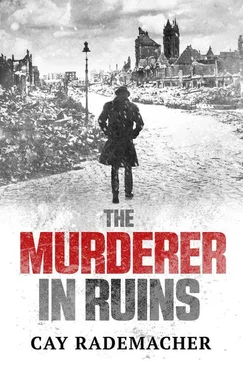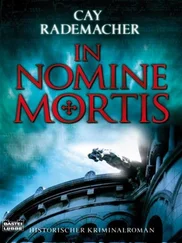Cay Rademacher - The Murderer in Ruins
Здесь есть возможность читать онлайн «Cay Rademacher - The Murderer in Ruins» весь текст электронной книги совершенно бесплатно (целиком полную версию без сокращений). В некоторых случаях можно слушать аудио, скачать через торрент в формате fb2 и присутствует краткое содержание. Год выпуска: 2015, ISBN: 2015, Издательство: Arcadia Books Limited, Жанр: Триллер, на английском языке. Описание произведения, (предисловие) а так же отзывы посетителей доступны на портале библиотеки ЛибКат.
- Название:The Murderer in Ruins
- Автор:
- Издательство:Arcadia Books Limited
- Жанр:
- Год:2015
- ISBN:9781910050750
- Рейтинг книги:5 / 5. Голосов: 1
-
Избранное:Добавить в избранное
- Отзывы:
-
Ваша оценка:
- 100
- 1
- 2
- 3
- 4
- 5
The Murderer in Ruins: краткое содержание, описание и аннотация
Предлагаем к чтению аннотацию, описание, краткое содержание или предисловие (зависит от того, что написал сам автор книги «The Murderer in Ruins»). Если вы не нашли необходимую информацию о книге — напишите в комментариях, мы постараемся отыскать её.
The Murderer in Ruins — читать онлайн бесплатно полную книгу (весь текст) целиком
Ниже представлен текст книги, разбитый по страницам. Система сохранения места последней прочитанной страницы, позволяет с удобством читать онлайн бесплатно книгу «The Murderer in Ruins», без необходимости каждый раз заново искать на чём Вы остановились. Поставьте закладку, и сможете в любой момент перейти на страницу, на которой закончили чтение.
Интервал:
Закладка:
At the end of Brenner Strasse two teenage layabouts were hanging around, keeping watch. They gave him no more than a bored passing glance. Stave was hardly the only one heading for Hansaplatz. Men in long overcoats and flat caps; old women with wicker baskets; a one-legged veteran scouring the ground for cigarette butts and almost falling on his face every time he bent down to pick one up; workers from the port; men with bulging worn briefcases; two Chinese standing by the entrance to the Lenz bar.
Stave wandered amongst the throng. Slowly he began to make out a pattern, like waves on an ocean, like the ripples created by a stone tossed into the water. There would be quiet whisperings and then suddenly off would come an overcoat or a briefcase lid would be opened, cigarettes and Reichsmarks would pass from hand to hand, each exchange done quickly, inconspicuously.
In the entrance to an apartment block a young woman was offering a pair of men’s shoes: ‘400 Reichsmarks,’ she whispered, a flurry of motion and the shoes went to an elderly man with a briefcase who handed her something in return, then both walked off in opposite directions. An old man was offering bread coupons to three women standing round him clearly outraged by the price. The old boy looked round nervously, obviously an old soldier, with boots too big for him, in a dyed Wehrmacht greatcoat held together with safety pins, and pulled out a tin can from his pocket: ‘Butter two nine.’ 290 Reichmarks for one pound. Some smugglers must have brought a big load through the control points, otherwise it wouldn’t be anywhere near so cheap. Either that or it’s not the real thing. Two men were whispering together in a doorway and then suddenly there was an aroma of coffee in the air, before the banknotes changed hands, lots of banknotes. An old, careworn woman disappeared with one of the Chinese into the bar. A boy, barely 14 years old, was heedlessly calling out ‘Flints’, ‘Flints for cigarette lighters, just 18 Reichsmarks!’ Another teenager was peddling Lucky Strikes, seven Reichsmarks each. Stave opened his ears and let the prices roll over him: ‘Wehrmacht cutlery, rust-free, four-piece, very useful for refugees – 23 Reichsmarks. A ball of yarn – 18 Reichsmarks. A pound of sugar – 80 Reichsmarks. A month’s food rations – 1,000 Reichsmarks.’
We must have a word with the man selling the ration card, thought Stave to himself. Most workers and office employees earned no more than 50 Reichsmarks a week. If you had to keep your nose to the grindstone for six weeks to buy a pound of butter, then you really were poor – and ready to deal yourself on the black market. Or to take risks.
Watches, gold coins, dollar bills in shoe polish tins. Two metres of zinc guttering. Three freshly caught trout. A clean false identity card to get through the denazification process. Blank passports. A tiny Persian rug. Penicillin from Allied supplies. A leather suitcase. A woman’s blouse.
But no false teeth, no truss, no medallion.
Damn it, thought Stave, the boy from the search team was right; how on earth could you link any of the objects for sale here to one of the victims? Could the blouse have belonged to the young woman? Did the old man pull the piece of guttering out of the rubble and get himself killed for it?
‘Police!’
The word resounded across the square, like the warning cry of some Stone Age caveman.
Police helmets, green overcoats, truncheons cut down the side streets, screaming women, obscenely cursing boys. People pushing, shoving, clanking everywhere as tin cans, Wehrmacht cutlery, spectacle frames, work tools land on the cobbles along with cigarettes, false identity cards and bundles of Reichsmarks.
The experienced dealers realise straight away that they’re caught and immediately dispose of the evidence. It’s gone for good one way or another but if they don’t find anything on you the penalty is less severe.
However their customers are novices. They clutch their booty and run for it, into an alleyway, into the next doorway, into a bar. But the police are suddenly everywhere, staring at them fiercely or maybe just laughing maliciously at them, even raising their hefty truncheons. But they don’t need to use them; it’s enough to bark out orders, then march towards the mass of people, crowding them ever closer together.
Stave cursed, pushing his way through the crowd, pushing and kicking his way through towards the man who had the ration card to sell. The man is not making a fuss, the ration card has almost certainly been dropped on the cobbles somewhere. He’s young, pale, dark hair shaved to a millimetre length, a horrible scar on his left cheek as if he’d been struck by lightning.
A former soldier, Stave reckoned. He had to be careful.
The chief inspector pushed an old woman to one side and found himself next to the man, took out his police ID and held it under his nose.
‘CID!’ he shouted at him.
There was more he wanted to say, read the man his rights for example, but all of a sudden a fist hit him in the face. It went black before his eyes and he could taste the salt of his own blood. Not very good manners, Stave thought to himself as the pain in his head diminished.
The younger man had turned, trying to flee. But he faced a wall of bodies. He pushed the old woman Stave had already shoved out of the way brusquely to the ground. But one foot got caught in her shopping basket, leaving him jumping up and down, swearing and kicking at the wickerwork.
Stave was on him in a split second, forcing his arm up behind his back and throwing him down on the cobbles so that the man cried out. The crack of ribs breaking. With the taste of his own blood still in his mouth, Stave leapt on him, both knees on his breastbone, and heard the crack of another. The dark-haired man didn’t cry out any more, just gurgled.
‘Nice move!’ somebody called.
Stave turned around and recognised the kid from the search team who had somehow fought his way through the crowd.
‘Judo,’ he replied, coughing, as he got to his feet and smoothed his hair. Eugene Holzel, an average-sized man with yellow horn-rimmed glasses had turned up at the Hamburg Criminal Police department a year ago. He turned out to have been German judo champion several times over. The Brits had banned him from indulging in his sport other than to train the police. Stave, rather naively, imagined the training might help him overcome his limp. Now he thought to himself with no little satisfaction, at last Holzel’s torture had been worth it, as he watched two uniformed policeman lead away the man, who was still bent double.
‘I’ll interrogate him first,’ Stave told the uniforms.
Men, women and a few children were all lined up against the wall of a big grimy apartment block. The Hansaplatz was covered with a thick layer of snow, as well as tins, boxes, paper rustling in the icy wind and a few things that were unidentifiable at a distance. A few of the policemen were chasing after Reichsmarks whirling in the air.
Stave wondered idly how many of the notes would ever be handed in. His burst lip was no longer bleeding but it had swollen up. I just hope I don’t dribble like a drunk during the interrogations, he thought. The dark-haired character would go down for six months. That’s if he wasn’t linked to the killings, in which case he’d be for the noose.
The uniformed police were dragging the prisoners two by two on to the backs of trucks that had come down Brenner Strasse. One or two women were crying, a few men were cursing the police, but most were calm. They were tired. Resigned to their fate.
Stave’s mind went back to other prisoners, thrown on to the back of a truck by the police in broad daylight, in the middle of town. It was only a few years back. Would it all never end? And who was to say that this was more justified than what happened back then? He had to force himself to think of the two strangulation victims, and that their murderer might be amongst those being loaded on to the back of these trucks.
Читать дальшеИнтервал:
Закладка:
Похожие книги на «The Murderer in Ruins»
Представляем Вашему вниманию похожие книги на «The Murderer in Ruins» списком для выбора. Мы отобрали схожую по названию и смыслу литературу в надежде предоставить читателям больше вариантов отыскать новые, интересные, ещё непрочитанные произведения.
Обсуждение, отзывы о книге «The Murderer in Ruins» и просто собственные мнения читателей. Оставьте ваши комментарии, напишите, что Вы думаете о произведении, его смысле или главных героях. Укажите что конкретно понравилось, а что нет, и почему Вы так считаете.











